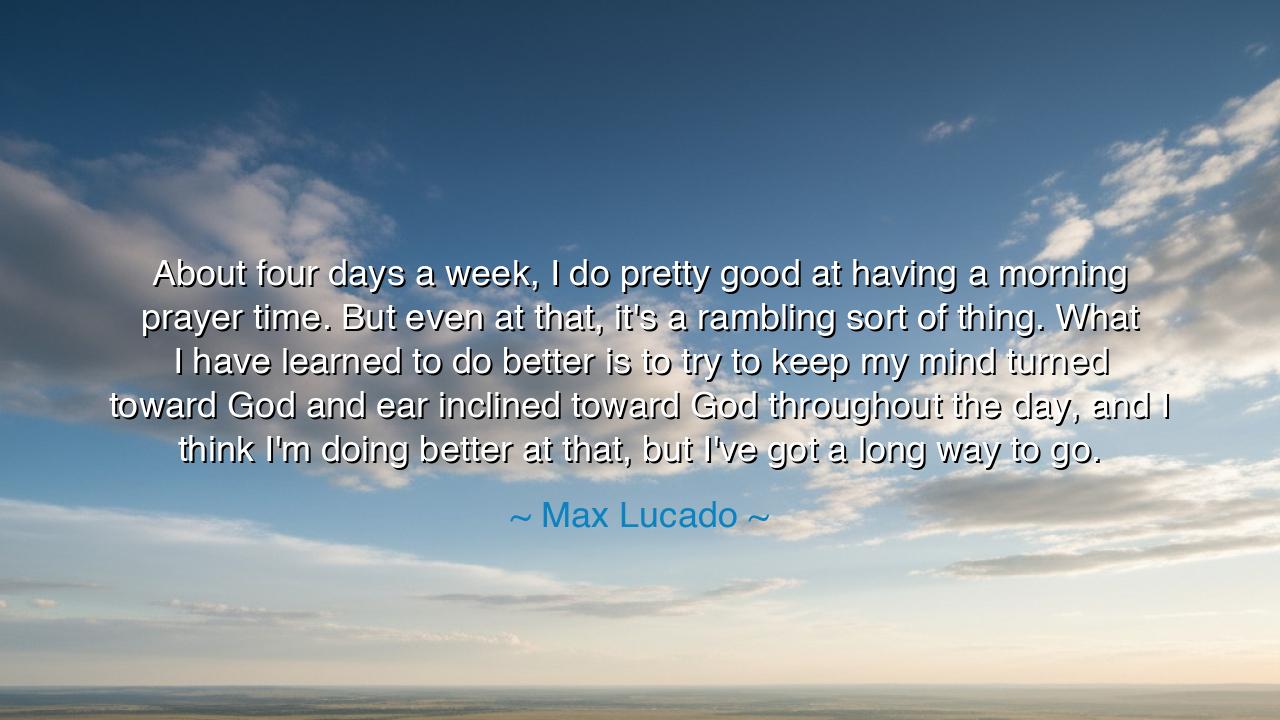
About four days a week, I do pretty good at having a morning
About four days a week, I do pretty good at having a morning prayer time. But even at that, it's a rambling sort of thing. What I have learned to do better is to try to keep my mind turned toward God and ear inclined toward God throughout the day, and I think I'm doing better at that, but I've got a long way to go.






Max Lucado, a shepherd of words and souls, once confessed with humility: “About four days a week, I do pretty good at having a morning prayer time. But even at that, it’s a rambling sort of thing. What I have learned to do better is to try to keep my mind turned toward God and ear inclined toward God throughout the day, and I think I’m doing better at that, but I’ve got a long way to go.” In these words, we hear not the pride of a saint, but the honesty of a pilgrim still walking the road of faith. His confession is not weakness, but strength, for it teaches us that devotion is not measured in perfection, but in perseverance.
The mention of morning prayer recalls the ancient custom of beginning the day with sacred words. In monasteries, the bells rang at dawn, summoning monks to chant psalms and lift their hearts heavenward. The prophets of Israel rose early to seek God in silence before the noise of life began. Yet Lucado admits that his prayers are often “rambling,” unfocused, imperfect. And in this, he is like all who have walked before him, for the human tongue often stumbles when it seeks to speak with the Eternal. But even in rambling, there is devotion — for to speak at all is to turn one’s heart upward.
Yet Lucado presses further, revealing what he has learned: that true devotion is not contained only in morning prayer, but in keeping the mind turned toward God throughout the day. This is the wisdom of ceaseless prayer, taught by the desert fathers and the apostles alike: to live not with occasional devotion, but with constant awareness. To incline the ear toward God is to listen for His whispers not only in the sanctuary, but in the marketplace, in the workplace, in the noise and in the quiet. It is to carry the flame of devotion into every moment, until life itself becomes a prayer.
History offers us shining examples of this truth. Brother Lawrence, a humble monk in seventeenth-century France, wrote of “practicing the presence of God” while washing dishes and sweeping floors. He confessed that his prayers were often simple, without eloquence, but his heart was constantly turned toward God, and in this, he found peace surpassing knowledge. Likewise, King David, though a warrior and ruler, wrote psalms that show he carried God in his thoughts continually, through triumphs and failures alike. These lives reveal the essence of Lucado’s words: that prayer is not only an act, but an atmosphere of the soul.
The humility of Lucado’s confession — “I’ve got a long way to go” — is itself a lesson. For who among us has mastered devotion? Even the holiest admit their imperfection. Augustine wrestled with distraction, Teresa of Ávila with dryness of spirit, yet both became fountains of wisdom for generations. The acknowledgement of imperfection does not weaken faith — it strengthens it, for it keeps the heart dependent on grace, not on pride.
The lesson for us is clear: do not be discouraged if your prayers are few, or if your words stumble. What matters is not eloquence, but orientation. Keep your mind turned toward God, and your ear inclined toward Him, and every moment can become a holy offering. Strive not only for set times of devotion, but for a life lived in constant awareness of the Divine. For the greatest prayer is not always spoken — it is lived.
Practical action flows: begin each day with a simple morning prayer, however brief, to anchor your heart. But do not leave devotion at the threshold of dawn. Throughout the day, pause often — in traffic, in labor, in rest — to turn your thoughts heavenward. Whisper gratitude, seek guidance, or simply incline your inner ear to listen. In time, these small acts will weave your life into a seamless prayer, and even in imperfection, you will walk more closely with God.
Thus Max Lucado’s words stand as both encouragement and challenge: “Keep your mind turned toward God and your ear inclined toward God throughout the day.” Children of tomorrow, remember this: holiness is not a destination achieved in a single prayer, but a journey walked in daily steps. Pray when you rise, pray as you labor, pray as you rest, and even in your stumbling, you will be carried. For the measure of faith is not perfection, but persistence.






AAdministratorAdministrator
Welcome, honored guests. Please leave a comment, we will respond soon